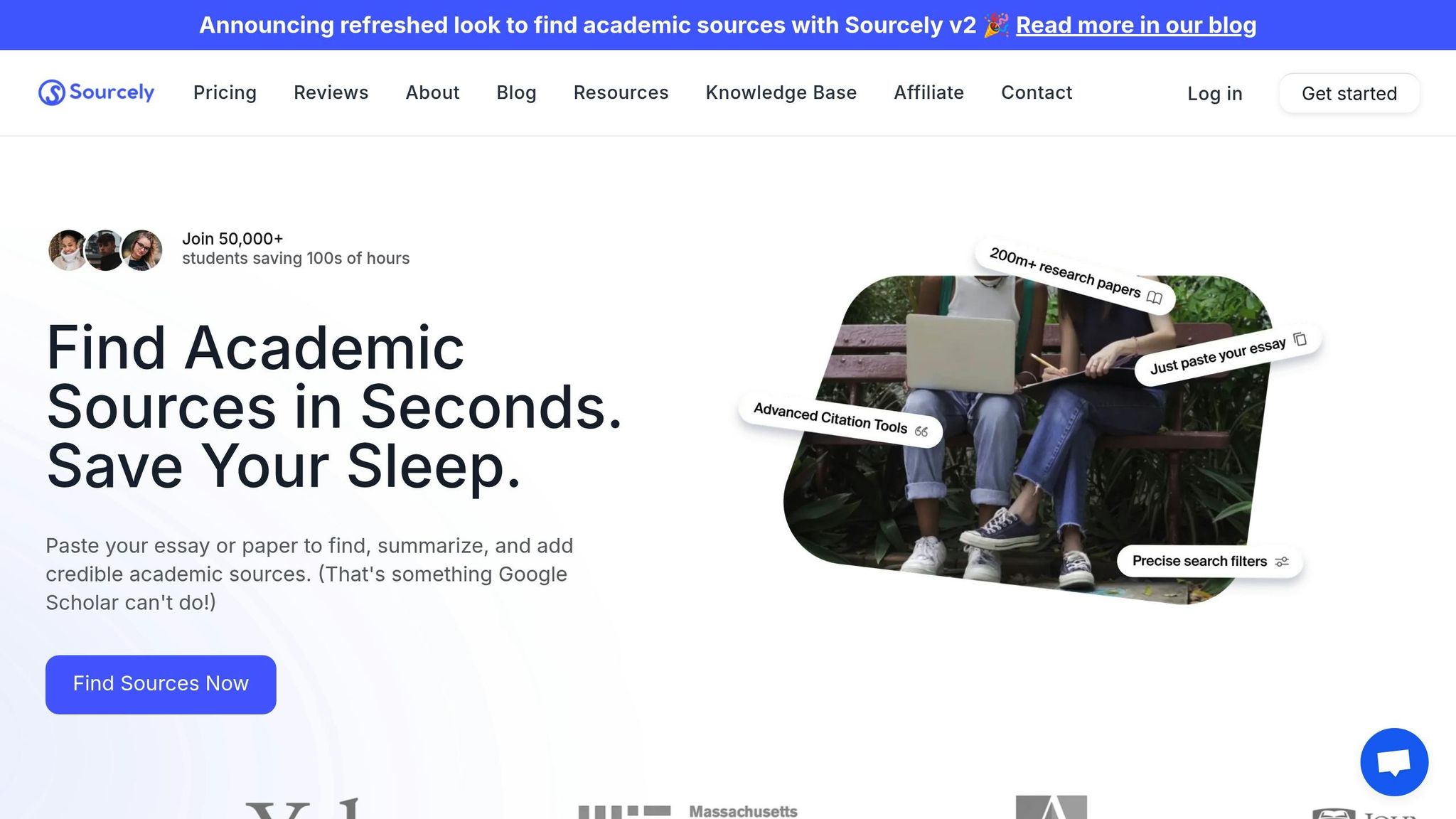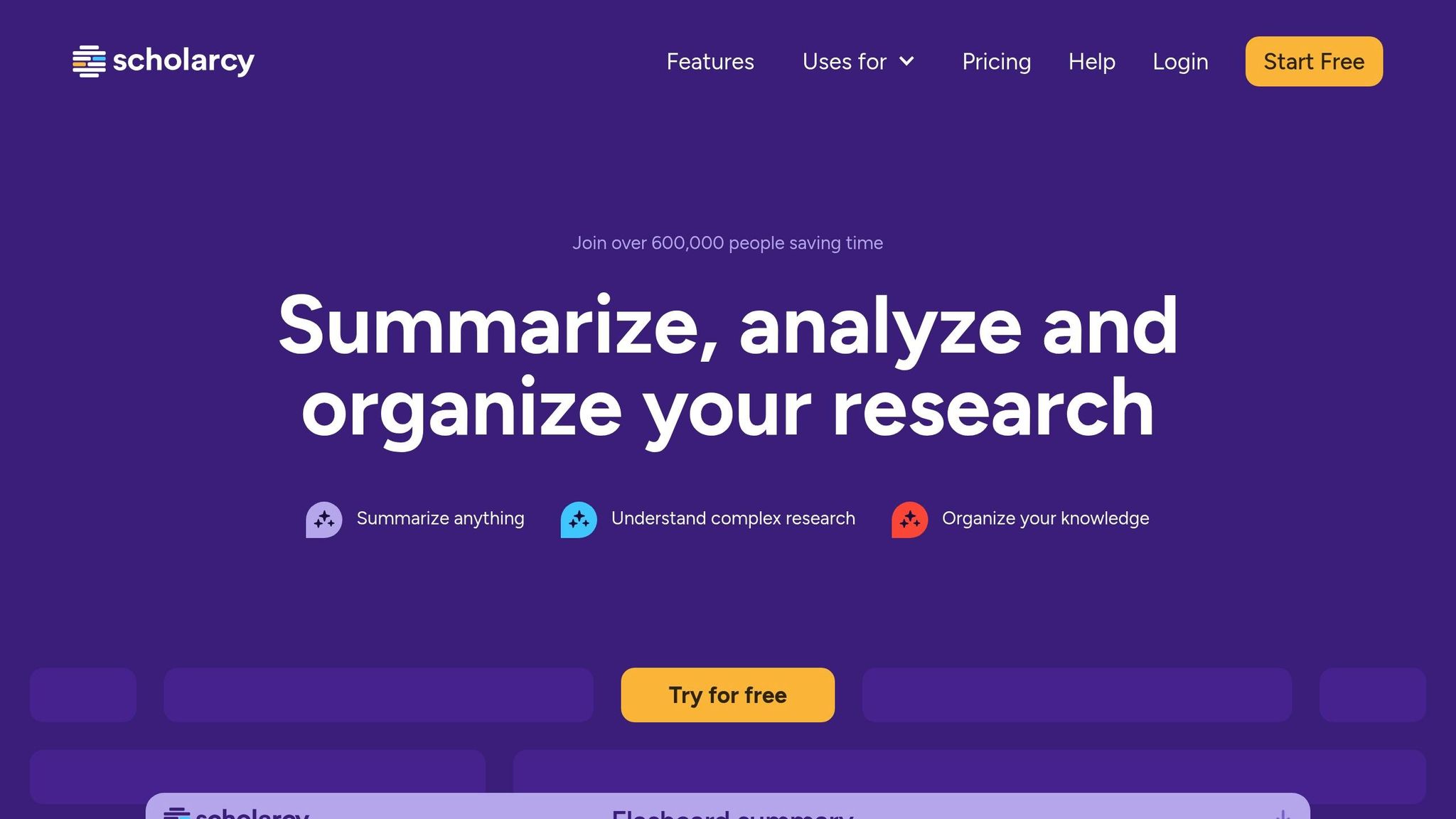
Boost Research Accuracy with AI-Powered Citation Checkers
AI citation tools simplify research by automating citation management, improving accuracy, and saving time. Here's what you need to know:
- Why It Matters: Manual citation errors are common (20–26% inaccuracy in biomedical literature). AI tools fix this by automating formatting, verifying sources, and managing references.
- Key Features:
- Auto-generate citations in styles like APA, MLA, and Chicago.
- Advanced search filters for finding sources using keywords, paragraphs, or notes.
- Detect outdated, retracted, or missing references.
- Top Tools:
Quick Comparison:
| Feature | Sourcely | Scholarcy | Scite |
|---|---|---|---|
| Starting Price | $17/month | $9.99/month | $12/month |
| Unique Feature | Essay-based search | Flashcard creation | Smart Citations |
| Best For | Students | Speed readers | Citation validation |
AI tools save up to 12 hours weekly, letting you focus on analysis and critical thinking. Use them wisely to enhance your research workflow.
Two Best AI Tools for Automatic Citation and Referencing
Why Correct Citations Matter
Errors in citations are surprisingly common, with inaccuracies in biomedical literature ranging from 20% to 26%. This makes mastering citation accuracy a crucial skill for researchers and academics alike.
Citations and Academic Standards
Citations play a key role in academic work. They acknowledge the original authors and allow readers to verify the research, ensuring transparency and upholding the integrity of academic communities.
"Academic integrity is truthful and responsible representation of yourself and your work by taking credit only for your own ideas and creations and giving credit to the work and ideas of other people." - Harvard Library
"If I have seen further, it is by standing upon the shoulders of giants"
Despite their importance, manual citation methods often fall short, leading to several challenges.
Problems with Manual Citation Work
Managing citations manually can introduce issues that affect the quality and reliability of research. Here are some key challenges:
| Challenge | Impact | Statistics |
|---|---|---|
| Reference Rot | Links break, making sources inaccessible | 1 in 5 STM articles affected; 7 in 10 for web resources |
| Formatting Errors | Citation styles become inconsistent | ~20–26% inaccuracy rate in biomedical literature |
| Source Validation | Verifying references becomes difficult | Over 30% of systematic reviews exclude non-English studies |
"Scholarly communication has built up an important tradition of citation... By doing so, we assure that our sources can be checked, verified, validated. But that implies that the material so referenced, so cited must be available for checking, verifying, validating. What happens if the source data [is electronic] and has been erased, or worse yet, altered since it was last used? The entire structure of scholarly progress would collapse."
As citation practices evolve and expectations around information sharing shift, these challenges are only becoming harder to navigate.
Main Functions of AI Citation Tools
AI citation tools have changed how researchers manage references, making citation creation faster and more accurate while ensuring compliance with academic standards.
Auto-Citation Features
Modern AI citation tools can generate citations in various styles with precision, saving time and minimizing errors. For example, Paperpal uses a database of over 250 million verified research articles to help users create accurate citations quickly. This functionality ensures researchers can easily cite diverse sources. Let’s take a closer look at how search filters enhance this process.
Source Search Filters
These tools go beyond basic keyword searches by offering advanced filtering options. Researchers can search using full paragraphs or notes, making it easier to find relevant sources. Here’s a breakdown of the filters available:
| Filter Type | Function | Example |
|---|---|---|
| Basic Filters | Source type, date range, language | Select by publication year or author name |
| AI-Powered Filters | Content analysis, relevance matching | "State" and "answer" filters in Findsight |
| Custom Filters | Keyword inclusion/exclusion | Sourcely refines searches via keywords |
These filters make it easier to locate the most relevant and credible sources for research.
Reference Format Options
AI tools don’t just help with finding sources - they also simplify citation formatting. They support a wide range of styles like Harvard, MLA, APA, IEEE, Chicago, and Vancouver, allowing users to switch formats with a single click. Additionally, many tools let users export citation lists as properly formatted Word documents.
Some tools, such as Sourcely, go a step further by analyzing entire essays. They suggest where citations should be placed, ensuring all claims are adequately supported throughout the text. This feature helps maintain the credibility and integrity of academic work.
sbb-itb-f7d34da
Best AI Citation Software Options
AI citation tools offer tailored solutions for various research needs. Here are some of the top choices.
Sourcely: Comprehensive Citation Tool

Sourcely gives users access to a massive database of over 200 million research papers. Its standout feature is a reverse search engine that lets researchers input uncited text and receive relevant source suggestions. This has made it a trusted tool for institutions like Harvard, MIT, and Stanford.
Pricing options include:
- Credit-based: $7 for 2000 characters
- Pro membership: $17/month
- Believer plan: $347 for 3 years
Scholarcy: Summarization and Citation Aid

Scholarcy breaks down complex research into manageable summaries using interactive flashcards. Its features include:
- Dividing research articles and books into smaller, digestible sections
- Rewriting content into third-person summaries
- Offering tools to critically analyze challenging texts
Scholarcy has a free plan with 10 summaries, while paid plans start at $9.99/month or $90/year.
Scite: Advanced Citation Analysis
Scite goes beyond standard citation formatting by analyzing how citations are used in other works through its Smart Citations system. Key features include:
| Feature | Purpose |
|---|---|
| Support Detection | Highlights citations that back up the original claim |
| Contradiction Check | Identifies citations that conflict with the source material |
| Context Evaluation | Explains how other researchers have used the citation |
This functionality helps users assess the credibility of their sources and ensure citations effectively support their arguments. These features make Scite a powerful tool for researchers aiming to refine their work.
Picking the Right Citation Tool
Finding the perfect AI citation tool can make a big difference in how smoothly your research process goes. The right tool can help you save time and improve the accuracy of your citations.
Main Selection Criteria
Take BibGuru AI, for example. It claims to cut down citation errors by 90% and boasts a 95% accuracy rate in formatting. These numbers highlight how much a well-chosen tool can enhance your research.
When evaluating tools, focus on features that streamline your workflow and improve precision:
-
Core Features:
- Support for various citation styles
- Compatibility with reference management systems
- Tools for verifying sources
- Real-time citation generation
- Accurate metadata extraction
-
Technical Aspects:
- Size and frequency of database updates
- Smooth integration with your existing research tools
- Compliance with data security standards
- An intuitive and user-friendly interface
To help you decide, here’s a quick comparison of costs and features for some popular tools:
Tool Cost and Features Chart
| Feature | Sourcely | Scholarcy | Scite | ScienceOS |
|---|---|---|---|---|
| Starting Price | $17/month | $9.99/month | $12/month | Free |
| Database Size | 200M+ papers | Unlimited | Continuous updates | Weekly updates |
| Key Function | Source finding | Summarization | Citation analysis | Reference management |
| Unique Feature | Essay-based search | Flashcard creation | Smart Citations | AI chat with papers |
| Best For | Students | Speed readers | Citation validation | Literature organization |
Experts suggest using these tools as a way to support your work, not as a replacement for your own critical judgment in citation practices.
Conclusion
AI citation tools have transformed how professionals manage references. Studies reveal that these tools can save users up to four hours per week initially, and this increases to 12 hours weekly within five years. This time-saving advantage allows researchers to focus more on analysis and critical thinking, rather than tedious citation tasks.
With 63% of professionals already using AI-powered tools, these technologies not only streamline workflows but also help reduce citation errors.
To make the most of AI citation tools, consider these steps:
- Try a free trial of platforms like Sourcely to explore their features.
- Keep a record of AI tool usage for transparency.
- Double-check citations generated by AI to ensure accuracy.
- Stay updated on publisher policies regarding AI tools.
"Thrix has been a game-changer. Instead of merely saving keystrokes, it actually saves time."
Research Tools and Links
Here are some helpful resources to improve your citation management and streamline your research process:
-
Official Learning Resources
Sourcely's Knowledge Base offers step-by-step tutorials and guides on citation features and source analysis. You can also sign up for their weekly newsletter, which includes curated recommendations for AI tools. -
Free Citation Tools
MyBib is a free tool that supports over 9,000 citation styles and works seamlessly with Microsoft Word and Google Docs.
| Platform | Resource Access | Best For |
|---|---|---|
| Sourcely | Knowledge Base, Updates | Tutorials and citation guidance |
| MyBib | Web access | Quick and easy citation management |
| scienceOS | Learning portal | Research methodology resources |
- Research Databases
Scite AI offers access to over 1.2 billion analyzed citations across 200 million sources.
"scite is an incredibly clever tool. The feature that classifies papers on whether they find supporting or contrasting evidence for a particular publication saves so much time. It has become indispensable to me when writing papers and finding related work to cite and read."
- Video Tutorials
Scholarcy's Quickstart Guide provides video walkthroughs for summarization, flashcard creation, and reference analysis, showcasing how to use these features effectively.
scienceOS also offers a free tier with access to 220 million research papers. For advanced options, their "Angel" plan is available for $7.95 per month.
These tools and resources can support you in refining and improving your research workflow.